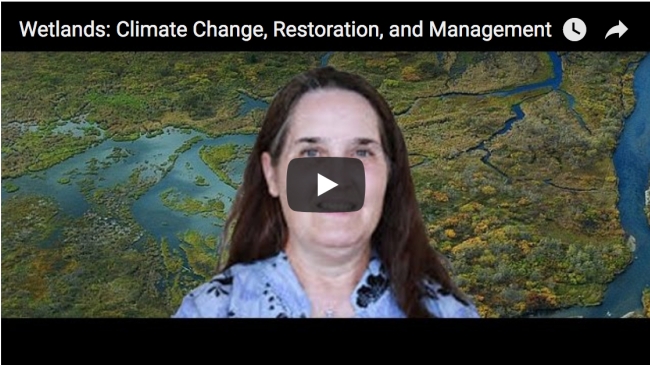Wetlands: Climate Change, Restoration, and Management
By Katie L. Burke
As the climate changes, wetlands around the world experience major shifts in their functioning that can put biodiversity and ecosystem services at risk. Understanding these changes can enable better wetlands management and restoration.
September 9, 2016
From The Staff Environment
Beth Middleton, a research ecologist with the Wetland and Aquatic Research Center (U.S. Geological Survey) and Sigma Xi Distinguished Lecturer, has studied wetlands all over the world, from Louisiana to China. In this Hangout, she discusses with me the importance of conserving them, what changes she sees in wetlands around the world, and what people can do about it.
A Storify of the Tweets detailing the discussion is shown below.
Wetlands: Climate Change, Restoration, and Management
What happens to wetlands given climate change? Beth Middleton, a research ecologist with the Wetland and Aquatic Research Center (U.S.G.S.) uses a macro-ecology approach to study wetlands and discusses how to restore and manage these ecosystems in our changing climate.
 What happens to #wetlands given #climatechange? Today,15:30 (ET) http://bit.ly/2c4ry3C an #AmSciGHO w/ @SwampPulse pic.twitter.com/Q0dsKSUadF
What happens to #wetlands given #climatechange? Today,15:30 (ET) http://bit.ly/2c4ry3C an #AmSciGHO w/ @SwampPulse pic.twitter.com/Q0dsKSUadF- Live #amsciGHO: @SwampPulse grew up in wetlands areas, talked to farmers about how they used land and how it had changed.
- Wetlands #AmSciGHO w @SwampPulse: W stoppage of traditional mgmt, woody species invading wetlands, threaten biodiversity of sm flowers etc
- Tragedy is we're losing rare species of wetland plants but most people aren't aware.-@SwampPulse #AmSciGHO http://bit.ly/2cbyFH0
- Storms have big effect on coast's vegetation. It changes as climate changes -@SwampPulse http://bit.ly/2cbyFH0 #AmSciGHo #HurricaneKatrina
- Wetlands #amsciGHO w @SwampPulse: May be able to influence survival of freshwater species during droughts thru river water increases
- Wetlands #amsciGHO w @SwampPulse: Q is how to tell if plants are stressed, when you need to intervene to help, and if you even can
- Wetlands #amsciGHO w @SwampPulse: During droughts, fresh water is at a premium, so you might not be given resources to help plants
- .@SwampPulse sees #climatechange impacting wetlands by more swings in storms: flooding followed by drought stresses wetland plants #AmSciGHO
- Wetlands #amsciGHO w @SwampPulse: We lack info abt even what happened in recent past, like 50 years. Recently better regional projections.
- When talking about what to do for #climatechange, we have to understand what's happening and then decide what to do. --@SwampPulse #AmSciGHO
- Wetlands #amsciGHO w @SwampPulse: Wetlands naturally want to change in location, in morphology, but often can't in modern day
- Wetlands #amsciGHO w @SwampPulse: Wetlands in colder habitats perhaps the most threatened, due to rising temps and melting permafrost
- Permafrost wetlands are most threatened by rising temps that will allow nonconventional plant species to take hold --@SwampPulse #AmSciGHO
- Wetlands #amsciGHO w @SwampPulse: Human development pressures in India include taking water fr rivers so not enough for wetlands
- Wetlands #amsciGHO w @SwampPulse: But in India impressed that so much concern for preserving wetlands and resident birds there
- Wetlands #amsciGHO w @SwampPulse: Growing concern for wetlands restoration in China, recognize value for humans, in last 5-10 yrs
- Wetlands #amsciGHO w @SwampPulse: We have to prioritize env protection despite any economic concerns. It's a question of will.
- What are wetlands? Via @WetlandsInt https://www.wetlands.org/the-problem/what-are-wetlands/ … #AmSciGHO
- Todays #AmSciGHO guest @SwampPulse has written a book about wetland restoration that received an award from @SWS_org http://bit.ly/2crCDPH
- Wetlands #amsciGHO w @SwampPulse:Wetlands are incredibly important to humans and feel very passionate about preserving them.
- This concludes live tweets of #AmSciGHO on wetland mgmt with @SigmaXiSociety Dist Lecturer @SwampPulse. Recording: http://bit.ly/2cbyFH0
- Sigma Xi Lectureship on Wetlands, climate change, restoration, management: https://www.youtube.com/watch?v=_XKK17vFZb8 …

American Scientist Comments and Discussion
To discuss our articles or comment on them, please share them and tag American Scientist on social media platforms. Here are links to our profiles on Twitter, Facebook, and LinkedIn.
If we re-share your post, we will moderate comments/discussion following our comments policy.